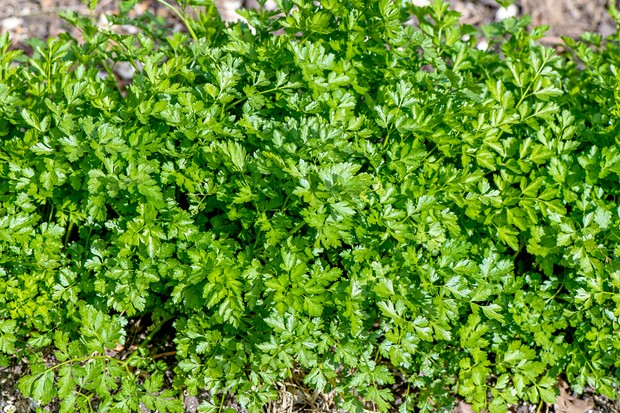
Parsley root (Petroselinum crispum var tuberosum) is a useful hardy winter vegetable, grown for its tasty edible roots which are long, white and tapered, topped with green leaves that are similar to flat-leaf parsley. Other names for parsley root include Hamburg parsley, because it is a popular vegetable in Germany, parsnip-rooted parsley, and turnip-rooted parsley. In flavour, the roots are like parsnip, although the texture is creamier and the flavour is sweeter, often described as nutty, carrotty, or like celery. The root is high in fibre and is not reported to have adverse side effects on digestion. Add parsley root to soups and stews, cook and use as a side dish, or look for parsley root recipes online.
What is parsley root?
Parsley root is different – although related to – the leafy type of parsley that is widely grown as an herb. In appearance, the roots are similar to a parsnip, though slimmer, and lacking the woody core that a parsnip has. Mature roots of parsley root are around 15-20cm long and 5cm in diameter. The leaves of parsley root form a clump that grows to around 45cm high. They look similar to flat-leaf parsley and can be used in much the same way.
How to grow parsley root
Grow parsley root in moist but well-drained, moderately fertile soil, in full sun to partial shade. Parsley root needs a long growing season so sow seed in early spring for an autumn to winter harvest.
Where to grow parsley root
Grow parsley root in sun or partial shade, in good, deep, fertile soil.
How to plant parsley root
Parsley root needs a long growing season. Sow seed in early spring for an autumn to winter harvest. Sow direct where plants are to grow on well-prepared soil, that’s free from stones and has not been manured recently as this could cause the roots to fork. If the soil is heavy, warm it beneath cloches for three weeks before sowing. If it’s prone to water-logging, mound up the soil to increase drainage, and sow seed on the top. Sow the seed in rows, 1cm deep and with 30cm between rows. Seed may be slow to germinate and can take up to a month to appear.
How to care for parsley root

Once seedlings appear, thin to around 23cm apart. Weed regularly to stop weeds competing with them for water and nutrients. Parsley root needs to be kept moist so water regularly and thoroughly during dry spells.
How to harvest parsley root

You can pick parsley root leaves throughout the growing season and use them like flat leaf parsley.
The roots are ready to harvest from late autumn and into winter, depending on when the seeds were sown. Harvest one or two to start with to see how long they are – ideally they should be around 12-15cm long. You can use them straight away or store them somewhere dark and cold for several months, you can also leave them in the ground until you need to use them. The roots will keep in the fridge for up to three weeks and can also be frozen.
Pests and diseases
While parsley root is not susceptible to particular pests or diseases, slugs may be attracted to the young plants, especially at the seedling stage, so protect with barriers such as copper or slug-resistant mulch, or use wildlife-friendly slug pellets, which are made using ferrous phosphate.
Advice on buying parsley root
- Parsley root tends to only be available from specialist suppliers that offer a wide range of edibles
- Parsley root is not available to buy as plants as the seedlings struggle when transplanted
- Always buy from a reputable supplier
Where to buy parsley root online
Frequently asked questions
Is a parsley root the same as a parsnip?
While parsley root is similar to parsnip in appearance, the two plants are botanically quite different, as is indicated by their botanical names: Petroselinum crispum var tuberosum (parsley root) and Pastinaca sativa (parsnip). In size and shape, parsley root is long and slender, while parsnip is shorter and broader, with a sunken top.
Can you eat parsley root?
Both roots and leaves of parsley root can be eaten, but parsley root or Hamburg parsley mustn’t be confused with leaf parsley (Petroselinum crispum) where only the stems and leaves are good to eat.
